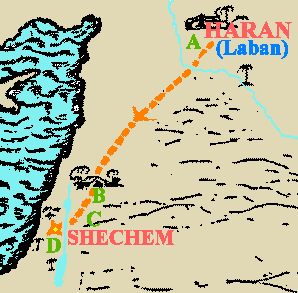
After Simeon's and Levi's heinous crimes tainting the name of Jacob before man,
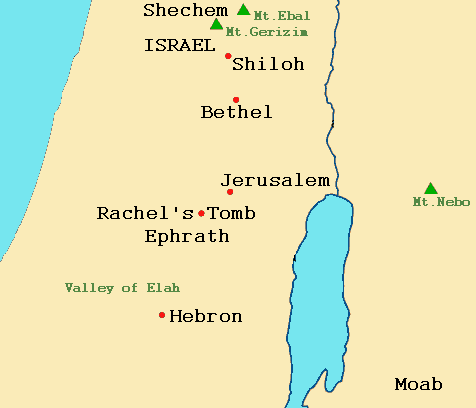 God told Jacob to leave
the Land of Shechem and travel to Bethel where Jacob built an altar and
worshiped God. Though not clearly stated, such 'quick' departure from Shechem
most likely had to do with 'damage control' in relation to Jacob's tarnished
reputation due to the acts of Simeon and Levi. Still within Rachel's
pregnantcy, Jacob then continued on from Bethel south towards Ephrath.
God told Jacob to leave
the Land of Shechem and travel to Bethel where Jacob built an altar and
worshiped God. Though not clearly stated, such 'quick' departure from Shechem
most likely had to do with 'damage control' in relation to Jacob's tarnished
reputation due to the acts of Simeon and Levi. Still within Rachel's
pregnantcy, Jacob then continued on from Bethel south towards Ephrath.
Rachel was pregnant when she left Haran of Assyria and her father Laban's land of Padan-aram. And Rachel was just now coming to term on the road to Ephrath. Jacob would not have ordinarily continued to travel beyond Shechem with Rachel in her last month(s) of pregnantcy, but due to the acts of Simeon and Levi and God's command to leave his grazing lands in Shechem, Jacob now traveled to other known grazing lands he remebered from his youth while yet in the house of his father Isaac. Jacob was traveling with his heards beyond the Tower of Adar to the fruitful grazing lands of Ephrath. But Rachel gave birth while still a short distance yet to go to Ephrath. And she died as a result of giving birth to Benjamin. It was there, about two miles south of the tower of Adar and some four miles south of the city that would later wear the name of Jerusalem that Jacob buried Rachel in the way to Ephrath. Rachel's Tomb is marked there still.
Simeon and Levi had sinned greviously and likely had an effect on the added distress which Rachel suffered from which she died in giving child birth. Thus Simeon and Levi had no hope of ever obtaining the birthright. And still there was Reuben, Jacob's eldest son, the firstborn son. But Reuben's claim to the birthright of the firstborn was now going to also be ended there in Ephrath. After Rachel's death Reuben commited a grevious sexual sin against the house of his father. He had entered into Bilhah, Jacob's concubine given Jacob by the hand of Rachel, and defiled the bed of his father with her. This would leave Judah to be the next oldest son in line of the birthright. Some time later Jacob had returned to the land of Shechem and retook possession of his land. After all, Jacob had bought and paid for that land. There is some evidence that when Jacob reentered the land of Shechum, despite owning the land, and perhaps due to the murderous reputation left there for the acts of Simeon and Levi, Jacob had to retake possession of his legal lands by some force. By Chapter 37, Jacob was fully independant of Laban's household, in his old age and was acting and functioning as God's patriarch of the covenant, the head of his own house. And at this particualar juncture, Jacob was staying in south in the valley of Hebron (Ephrath?) and was just sending his sons to graze the flocks in the highlands of Shechem.
|
|
|
|
 CHAPTER 37
CHAPTER 37
 Jacob loves and favors Joseph, who is hated by his brothers—Joseph dreams that his parents and brothers make obeisance to him—His brothers sell him into Egypt. |
Jacob's Beloved son is Joseph, the firstborn of his first selected wife Rachel—Out of jealousy and envy, coveting that which is not theirs, Joseph's brothers entreat a hatred toward their brother—Joseph has prophetic dreams—For the price of a slave, Joseph is sold into the Land of the Dead, Egypt. |
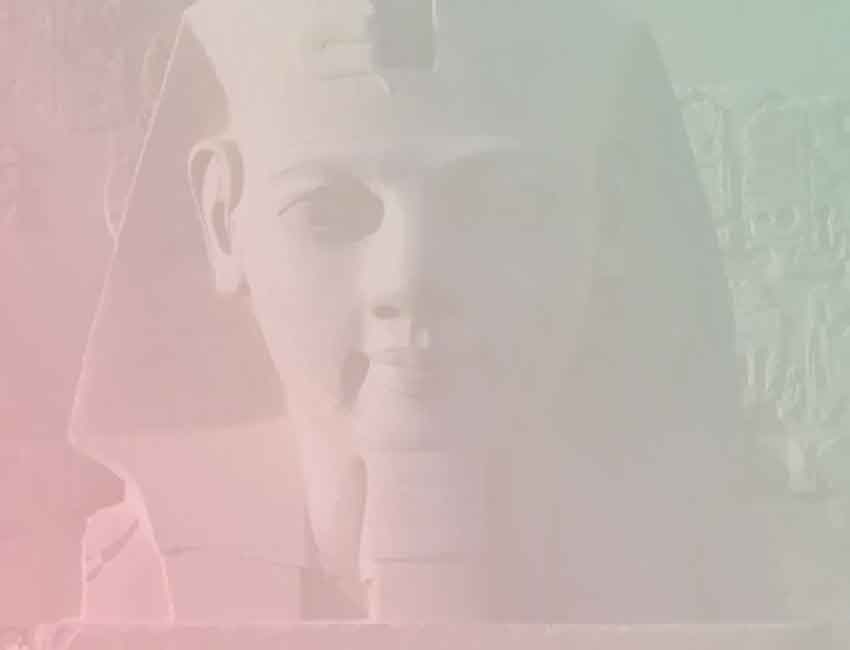 |
Jesus and Joseph ~ Both Shepherds of Thier Father's Flock |
||
|
Joseph is a phsyical or temperal setting and Christ in the spiritual administration were both shepherds of Israel. Both had the chore of registering an evil report concerning the other shepherds, his brothers, who tended the flocks. The Pharisees, Joseph's brothers cared not for the sheep but to their own interest acted as the hirelings which cared not for the sheep. |
|
|
1 AND Jacob dwelt in
the landa awherein
his father was a bstranger, in the land of Canaan.
2 These are the agenerationsa of Jacob. bJoseph, being seventeen years old, was feeding the flock with his brethren; and the lad was with the sons of Bilhahb, and with the sons of Zilpahb, his fatherís wives: and Joseph brought unto his father their evil reportc. 3 Now Israel loved aJoseph more than all his children, because he was the son of his old age: and he made him a bcoat of many ccoloursa. 4 And when his brethren saw that their father loved him more than all his brethren, they hated him, and could not speak peaceably unto him.
Abraham was not the first born of Tarah and Abraham had obtained it. Isaac was not the first born of Abraham and Isaac had obtained it. Jacob was not the first born of Isaac and Jacob obtained it. Joseph was not the first born of Jacob yet it would be Joseph and his son Ephraim who would obtain it (See; Genesis 48). By the way, Ephraim was not the first born of Joseph, and he would obtain it. Rather than consider that Judah was worthy of the birthright covenant of the firstborn, which he was not, it would be better to consider that Judah being abitious had designs on obtaining the birthright blessing of Jacob. This was Judah's perspective on the matter. If one can understand that Judah was 'smart' enough to figure out that he was next in age after Reuben, Simeon, and Levi. And that Judah had begun to consider in his personal aspirations that he was positioned to obtain Jacob's greatest blessing of the firstborn, then one can begin to appreciate Judah's motives and actions as recorded in Genesis chapter 37. |
1a
Jacob dwelt in the land At some point Jacob returned form the
land of Ephrath and again dwelt in the land he had bought of Shechem. This
was the nature of the herdsman, ever moving his flocks and herds to other
grazing lands.
2a These are the generations Jacob is now well established in the land of Cannan and is acting under God as the patriarch of his own lands and family without the influence of being subject to Laban. 2b Sons of Bilhah and . . . Zelpah Bilhah was the concubine given Jacob by Rachel and it is likely that Joseph and Benjamin where cared for in conjunction with her care as opposed to the house of Leah. But all three other 'houses' other than 'mother Leah' would have been looked down upon by the now dominant woman of the family and her six sons. This created somewhat a natural balance, the six sons of Leah and the other six sons of the other wives. 2c Joseph brought unto his father their evil report The real significance of this point must be considered in respect to all the facts. As sons of the concubines, the sons of Bilhah and Zilpah had little motive to worry much about Joseph. They were the 'second class' sons already, and had absolutely no hope of gaining the birthright of the firstborn of Jacob. But this occassion would give rise to them being able to be turned against Joseph by some one who had greater motivation and expectantcy of getting gain by Joseph's removal from the scene.
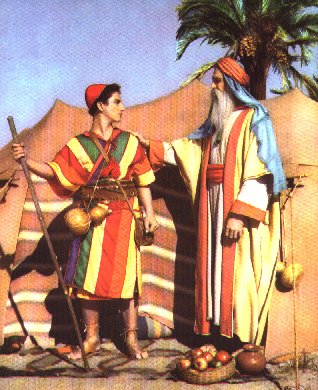 The Coat of the Covenant
The Coat of the Covenant
3a
Coat of many colors Coats or long sleaved
'tunics' of well-to-do herdsmen and sojourners were often very colorful.
Thus the fact that Jacob made Joseph a 'colorful' coat or tunic had no great
significance itself. It indicated in relationship to the 'token of the
everlasting covenant' (See Genesis 9), Jacob's intent that Joseph was the
selected son of the birthright covenant of the fathers. Jacob's other sons
would have themselves worn 'colorful' tunics but not such a one as a
'rainbow' coat of 'many colors'. It was the fact, as recorded from the oldest
sources of the Septuagint, that it was not just of one, two or three colorful
colors, but that Joseph's coat was of many colors, and that had great
significance. The later Hebrew or Jewish sources seem to have 'cut' from
their record the fact that the tunic of Joseph was of 'many colors'. The
reason would have been to 'hide' the fact that Joseph was the indicated son
of the covenant by the rainbow coat of colors and not Judah.
Joseph's brothers would have seen this 'rainbow coat' as an indication that
Jacob planned to give the birthright to Joseph. And to no other than Judah
would it mattered the most, for it was Judah who had aspired to the honor and
after the failures of Rueben, Simeon and Levi, he fancied himself as next in
line.
|
1a HEB of his father's sojournings b TG Stranger 2a IE genealogical lines b Gen. 41:46 (46-47, 54) 3a TG Israel, Joseph, People of b Alma 46:23 (23-24) c The Septuagint word indicates many colors, but the HEB. term may indicate simply a long coat with sleeves
 Now the visual sign or token of the everlasting covenant of the fathers had been established as the 'rainbow'. It was very much of many colors. And Jacob had just Joseph a coat seemingly reflective of this visual symbol of many colors, a coat of many colors. Remember Jacob's nature was that of a common man about the camp of his father and mother, Isaac and Rebekah. He had the skills and talents to weave and make just such a coat from the dyed wools of the flocks. Just how closely were Jacob's intent, the coat of many colors, the rainbow symbol of the covenant, and Joseph's dreams tied to Joseph being the obvious selection for the birthright of the firstborn covenant of the fathers? Recall that Jacob himself was very aware of that covenant right when he was young and obtained the right from Esau for the cost of feed of pottage because Esau despised the covenant blessing. "So the birthright went to Joseph. That's why he was given the coat of many colors. It wasn't because he was a favorite son, necessarily. It was because he was the birthright son. The coat carried that special designation." (Russel M. Nelson, Perfection Pending and Other Favorite Discourse, p. 203) |
Jesus and Joseph ~ Both Beloved of Thier Father |
||
|
Joseph, as was Jesus, the beloved son of his father. Jesus as Jehovah was the 'firstborn' son of the Father in the spirit and was selected as the son of the 'Covenant', which covenant is that of the 'firstborn'. Joseph was recognized by Jacob as his son of the promise, the promise of the 'firstborn'. Therefore the coat of many colors is that which represents the token of that covenant, the rainbow. Jesus confirms that Joseph and his son Ephraim are those through who the covenant was preserved (See Jeremiah 31:9). |
|
|
.5
¶ And Joseph dreamed a adream, and he told it his
brethren: and they hated hima
yet the more.
6 And he said unto them, Hear, I pray you, this dream which I have dreamed: 7 For, behold, we were binding sheaves in the fielda, and, lo, my sheaf arose, and also stood upright; and, behold, your sheaves stood round about, and made aobeisance to my sheaf. 8 And his brethren said to him, Shalt thou indeed reign over usa? or shalt thou indeed have dominion over usa? And they hated him yet the more for his dreamsb, and for his words.
|
5a they hated him
There are degrees of 'hate'. Jacob did not 'hate' Leah, he prefer Rachel over
her, but he did not hate her. Yet the Jewish scripture presents that he
hated her. Thus this 'hatred' toward Joseph should be considered in degrees
from the brothers who did not 'prefer' Joseph to those who hated him enough
to 'murder' him.
7a Sheaves in the field Unlike today's ranchers, who do not farm, and today's farmers, who do not ranch, the herdsmen of the fields in Jacob's day where not 'rachers' only, The did sow their fields and harvest crops as well as run herds of animals as indicated by Isaac's performance. 8a reign over us ... have dominion over us Certainly Joseph's dreams did have a fulfillment in Egypt when Joseph did rule in Egypt and his brothers where subject to his rule and dominion. And they were happy for it, for it did preserve their very lives in the temporal sense. But does Joseph's dreams and Jacob's pronouncement that upon Joseph in his blessing (Genesis 49:26) have a far more reaching meaning and intension? The blessing given Joseph by Jacob was after the events of Israel coming to Egypt and bowing down before Joseph at that time. What further could this blessing be?
 8b they hated him yet the more for his dreams, Herein the use of the plural 'dreams' before the presentation of the next dream, does lay hint that there were more 'dreams' than just these two dreams herein reported. In Jewish tradition there is at least one more dream as referenced in the column to the right. It speaks of the gathering of fruit and how Joseph's brothers' fruit all rotted but that Joseph's fruit remained unspoiled. Joseph explained that it spoke of the Messiah coming of his 'fruit'. Since Judah would usurp to that claim through the surogate performance of Boaz, the Jewish kept record seems to have edited out this dream likely at this point in the scriptural record. |
5a
TG
Dreams 7a Gen. 42:6 (6, 9); Gen. 43:26 (26-28); Gen. 44:14;
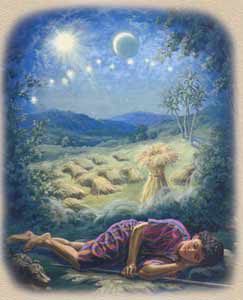 In this dream Joseph and his brothers were all gathering fruit. The fruit which his brother's gathered all rotted but Joseph's remained unspoiled. Joseph explained that the children of Israel would set up dumb idols to worship, but that they would vanish at the coming of Joseph's promised descendant, Messiah ben Joseph (Isaiah and the Prophets, p. 28 & Ginzberg, The Legends of the Jews vol. 2:7). |
There are numerous ways in which Joseph of Egypt did personify his future hier of the firstborn.
|
||
|
9 And he dreamed yet
another dream, and told it his brethren, and said, Behold, I have dreamed
a dream more; and, behold, the sun and the moon and the eleven stars made
obeisance to me.
10 And he told it to his father, and to his brethren: and his father rebuked him, and said unto him, What is this dream that thou hast dreamed? Shall I and thy mother and thy brethren indeed come to abow down ourselves to thee to the earth? 11 And his brethren aenvied him; but his father observed the saying. |
Tradition holds that there was at least one more dream which Joseph had. If so, it is likely that the content of the dream is why it never made its way into the Jewish cannon of scripture. Tradition states of this dream: Joseph and his brethren gathered fruit. His brother's fruit rotted but Joseph's fruit remained. Joseph explained that the children of Israel would set up dumb idols to worship, but that they would vanish at the coming of Joseph's descendant, Messiah ben Joseph. ('Isaiah and the Prophets', p. 28 & 'Ginzberg, The Legends of the Jews' vol. 2:7). |
10a
Gen. 50:18 11a TG Envy
|
Missing from the Scriptures |
||
|
.12
¶ And his brethren went to feed their fatherís aflock
in Shechem.
13 And Israel said unto Joseph, Do not thy brethren feed the flock in Shechem?a come, and I will send thee unto them. And he said to him, Here am I. 14 And he said to him, Go, I pray thee, see whether it be well with thy brethren, and well with the flocks; and bring me word again. So he sent him out of the vale of Hebrona, and he came to Shechem. 15 And a certain man found him, and, behold, he was wandering in the field: and the man asked him, saying, What seekest thou? 16 And he said, I seek my brethren: tell me, I pray thee, where they feed their flocks. 17 And the man said, They are departed hence; for I heard them say, Let us go to Dothana. And Joseph went after his brethren, and found them in Dothan.
|
13a
Do not thy brethren feed the flock in Shechem? Now from the Valley
of Hebron where Jacob dwelt to the plains of Shechem was some distance. Jacob
was in his old age and perhaps no longer made the trek to Shechem to graze
the herd but only sent it under the care of his sons. 14a vale of Hebron The 'valley of Hebron' would likely be the same as the 'Valley of Elah' or the 'valley of terebinths', (terebinths being oak like Mediterrenean trees of the cashew family and the source of turpentine). Whether this was more closely associated with the Land of Ephrath to which Jacob was traveling in Chapter 35 cannot be determined. 17a Dothan Just over 10 miles north of Samaria is an area which has retained this name. It was a fertile grazing area on the great caravan road. And as 2 Kings 6:13 points out, there was a city there which may explain its draw for the sons of Jacob.
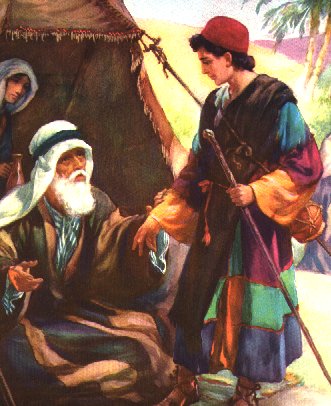 |
12a Gen.
46:34
|
|
18 And when they saw him
afar off, even before he came neara
unto them, they aconspired
against him to slay him.
19 And they said one to another, Behold, this adreamer cometh. 20 Come now therefore, and let us slay hima, and cast him into some pitb, and we will say, Some evil beasta hath devoured him: and we shall see what will become of his dreams. 21 And aReuben heard it, and he delivered him out of their hands; and said, Let us not kill him. 22 And Reuben said unto them, Shed no blood, but cast him into this pit that is in the wilderness, and lay no hand upon him; that he might rid him out of their handsa, to deliver him to his father again.
Rebellious Children Jacob was old, well over 70 years, but he still tryed to reign in his rebellious sons. What were Jacob's sons doing beyond the boundries of their own lands in Shechem, sitting just outside the city of Dothan? One's own guilt spurs much anger when one is 'caught' in the act. And here was Joseph, Jacob's eyes and ears ready upon the spot as Jacob's sons are caught beyond their family borders, hanging about the city limits of Dothan, the city of 'pagan lights'. 'Here comes Joseph, he who will tell father on us, he who thinks by his dreams to rule over us.' Some teach that it was Jacob's love for Joseph which caused his brethren to sell him into slavery. They consider little the brother's resposiblity for their own actions. Jacob's love for Joseph is not what caused the criminal act no more than it was Jacob's love for any of his sons. For he loved them all. It is the nature of the other sons to rebell against their fathers caring control and it was their anger for being caught out their motived the most of them for doing the criminal act, except in Judah's case, he had higher motivation. You might as well blame God for the fact that Cain killed Abel for God had respect unto Abel's offering and not unto Cains. So it was God's fault that Cain envyed Abel his brother and killed him, right? |
18a
saw him afar off, even before he came near Someone was watching
for Joseph to appear. Someone was specifically looking for just such an
opportunity. This was not some off the cuff sudden impulse to kill younger
brother. Every 'conspiracy' has a leader, an instigator. The Jewish scripture
attempts to make it seem that the 'brothers' were all of one voice upon the
matter. But a careful analysis will show that it was not. For before Joseph
even reached his 'brothers' 'they' had been lead into decideing to kill
Joseph. This premeditation had been stewing in someone's mind for some time. 20a Let us slay him It doesn't matter who first verbalized these words. Simeon and Levi had already killed and could have easily been led into suggesting murder by rousing their anger and asking what shall we do to Joseph. Their father's disappointment was already been laid upon them, but would they further risk the murder of their younger brother without some out side guidance? 20b Pit The pit may have been a seasonal or 'dry well' as it is stated that there was currently no water in it (verse 24). 20c evil beast The most likely canidate for the beast that would take down a man (Joseph was 17) would be a lion. Recall that even as late as the era of Sampson and David, there had been lions common in the land. 22a Out of their hands He may have realized that they would overpower any action while they were present.
This sentiment plus disatisfaction with Joseph being Jacob's 'tell barer' was enough to spur the emotions high. The sons of Leah would have little taste to ruled by one of Rachel's sons. Even the 'seond born sons' of the concubines who had suffered from being 'told upon' to Jacob, had a distaste for Joseph. |
18a
TG
Conspiracy 19a HEB master of dreams 21a Gen. 42:22;
In a criminal investagation, investigators will search for two major elements which tend to lead to the perpetrator of the crime. There is 'motive' and then there is 'opportunity'. Who among the sons of Jacob had the strongest motive, who would gain the most from Joseph's death? Reuben had already lost the birthright and though he was guilty of sexual sin, murder was not in him. Simeon and Levi had already lost the birthright and though murder was in them, they had the most to lose if they were ever expected of such again, especially against Joseph. Issachar and Zebulun, being the youngest of six brothers of Lean, would never step above their older brothers to perpetuate such an act of their own iniative. The other four sons of the concubines would never suggest such against the sons of Rachel and Leah of their own accord and they had nothing to gain. The only son with a strong enough motive for murder was Judah. He had everything to gain upon Joseph's demise. And the opportunity had been sought out and was at hand. |
|
23 ¶ And it came to pass,
when Joseph was come unto his brethren, that they stript Joseph out of
his acoat, his coat of many colours that was on him;
24 And they took him, and cast him into a pit: and the pit was empty, there was no water in it. 25 And they sat down to eata bread: and they lifted up their eyes and looked, and, behold, a company of Ishmeelites came from Gilead with their camels bearing spicery and balm and myrrh, going to carry it down to Egypt. |
25a sat down to eat While Joseph plead for release, the accepted peer presure enforced behavior was to go about their day's busines. It was time to eat. Which brothers' hearts were touched by Joseph's pleas but where held bound by the preasure the the older three, Simeon, Levi and Judah? Certainly Judah's heart was not listening to his brother's crys. Judah did not support Reuben's interference which had spared Joseph. Judah's thoughts were now how else he might rid himself of Joseph since murder had failed? |
23a Alma
46:24 (23-27)
|
|
While Joseph was still approaching the decission had been made very speedily concluded upon. It moved so swiftly that it had to be a calculated move upon the part of one of the three, Simeon, Levi and Judah. Reuben had not been present in the conspiring group and the minute that Reuben heard of the plot, Reuben in effect took the wind out of the sails of the conspiracy. Reuben may have not had the highest of morales, but he was no murdered. What Reuben said was this, "Let us not kill him (Gen. 37:21). Do not sin against the child (Gen. 42:22)." But Reuben must have still seen that the anger and hatred had been stirred and fired, and was boiling strong, for he devised a strategum to deliver Joseph from their hands. Therefore Reuben suggested, "Shed no blood, but cast him into this pit that is in the wilderness, and lay no hand upon him." Reuben said this in order to remove Joseph from the hands of his angered brothers and Reuben planned to later deliver Joseph back to father Jacob again (Gen. 37:22). Not all the brothers where so keen upon murder as the ringleader(s) had been, for there was almost an immediate acceptance of Reuben's stated alternative. By the time Joseph arrived it was settled, they would not kill him but they would cast him into the pit. Upon Joseph's arrival those still set in their hatred stript young Joseph of his hated coat of many colors. Herein lies a hint as to the real concern. It was not that Jacob loved Joseph best. It was that Joseph was the apparent heir to the blessing of the firstborn. The fire that brought murder to the boil included the statement 'Behold the dreamer cometh' (Gen. 37:19). And the first thing removed and attached beside Joseph, was the hated coat of many colors, the coat which symbolized that covenant of the firstborn being placed upon Joseph. Joseph was thrown into the pit and for the majority of the sons of Jacob the ordeal was ended as they then proceeded to the normal business of the day, which was to tend the flock and eat lunch as that was the time of the day. But the one who would continue the assult, who was not satisfied with Reuben's proposal still desired to be rid of Joseph. The first opportunity had been foiled by Reuben. The brothers where again separated into those who would eat their mean now and those who would tend the herds while the others ate. Reuben had not joined the first shift mid-day meal group. Not all could eat at once while there was the herds to tend. And Reuben was of that group. But of those who remained in 'camp' to eat was found the one who still had designs to rid himself of Joseph. The record states that while these brothers ate, Joseph did plead with them from the pit. But what was noticed and brought to the attention of the eating brothers was not Joseph's pleas, it was that a caravan of merchants and traders of the Ishmaelites were approaching their encampment. An alternative opportunity had just presented itself to the one who was still set upon the demise of Joseph. Things moved quickly and by the time Reuben had returned from his turn at the flocks while the others ate, Joseph was gone. The brothers who remained to eat their lunch first had sold Joseph to the Ishmaelites and Joseph was gone. There is some question as to whether Reuben then or ever found out or knew the true fate of Joseph before finding Joseph alive in Egypt. Reuben did not consider Joseph to be still alive. It seems that the story which the contriving brothers had arranged to tell Jacob may have been the same story told to Reuben. When Reuben speaks before Joseph in Egypt years later, he seems to speak from the perspective that Joseph's blood had been spilt and was thus required at the Brother's hands. Reuben had stated, "Spake I not unto you, saying, Do not sin against the child; and ye would not hear? therefore, behold, also his blood is required."(Gen. 42:22) It would seem that the contriving brothers who got rid of Joseph, had attempted to tell Reuben that the child had been killed by beasts. But Reuben did not appear to buy into that story, for he rather considered that Joseph had been killed by his brothers and that his blood would be required of their hands. Reuben may have been part of the cover up represented to Jacob for the reasons of not exposing his brothers and perhaps for the purpose to shield his father Jacob from the truth that he had suspected, that the conspiring brothers had actually killed young Joseph. |
||
|
.26
And Judah said unto his brethren, What profit is it if we slay our brother,
and conceal his blood?
27 Come, and let us sell him to the Ishmeelites, and let not our hand be upon him; for he is our brother and our flesh. And his brethren awere contenta. 28 Then there passed by Midianitesa merchantmen; and they drew and lifted up Joseph out of the pit, and sold Joseph to the aIshmeelitesa for twenty pieces of silverb: and they brought Joseph into Egypt. 29 And Reuben returned unto the pit; and, behold, Joseph was not in the pit; and he rent his clothes. 30 And he returned unto his brethren, and said, The child is anot; and I, whither shall I go? |
27a
his brethren were content Due to Reuben's opposition, the mixed
feelings of the brothers would range from those who were releived that Joseph
was not to be murdered to those who still fostered their hatred. Rather than
let it settle out to just leaving Joseph in the pit, Judah devises a
compromise which serves his purposes. which the lunch group would still
accept.
28a Midianites ... Ishmeelites Men from both groups were present. 28b twenty pieces of silver For the price of a slave and upon the iniative of Judah's voice, Joseph was sold into Egypt. This has a parallel element in Joseph's eventual descentant of the covenant. It was for the price of a slave in the day of Jesus that he was sold by Judas (Judah), which was thirty pieces of silver. |
27a HEB hearkened 28a Gen. 39:1 30a Gen. 42:13;
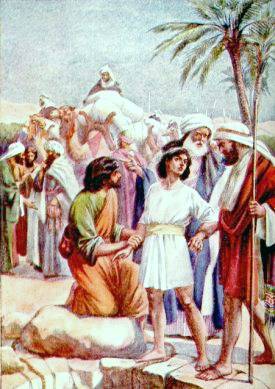
Image from
ASB, public domain.
|
|
~ Speak Monkey Speak ~
It is Judah who speaks and his words reveal him. Judah said unto his brethern,
"What profit is it if we slay our brother, and conceal his blood? Come, and
let us sell him to the Ishmeelites, and let not our hand be upon him; for he
is our brother and our flesh." Some consider that Judah saved Joseph from
death. But that is not according to the record. Reuben had
already settled that matter, Judah, if he truely were concerned for Joseph's
life would have supported Reuben, who a number of the brothers did support.
What is actually being accomplished is a speech which compromises Reuben's
|
||
| 31
¶ And they took Josephís coata,
and killed a kid of the goats, and dipped the coat in the blood;
32 And they sent the coat of many colours, and they brought it to their father; and said, This have we found: know now whether it be thy sonís coat or no. 33 And he knew it, and said, It is my sonís acoat; an evil beast hath devoured him; Joseph is without doubt brent in pieces. .34 And Jacob rent his clothes, and put sackcloth upon his loins, and mourned for his son many days. .35 And all his asons and all his daughters rose up to comfort him; but he refused to be bcomforted; and he said, For I will go down into the grave unto my son cmourning. Thus his father wept for him. 36 And the Midianites asold him into Egypt unto bPotiphar, an cofficer of Pharaohís, and dcaptain of the guard. |
31a
took Joseph's coat Left in torn remnants, Joseph coat
repesented the remnants of Jospeh's descendant scatterd in all the world.
|
33a Alma
46:24 (23-24) b Gen. 44:28 35a Gen. 46:7; b Ps. 77;2; Ether 15:3; Moses 7:44 c Gen. 42:38; TG Mourning 36a Ps. 105:17; 1 Ne. 5:14; 2 Ne. 3:4; Alma 10:3; b Gen. 39:1; c HEB eunuch (which often designates a royal official. d HEB chief of the butchers, or the cooks, probably the chiefsteward.
|
|
|
|
|
|
|